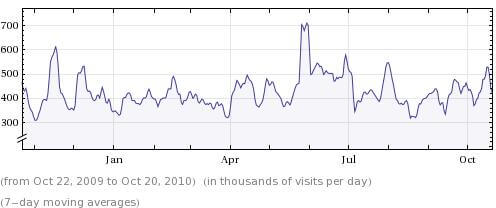
Oh Wolfram Alpha, why don’t more people love you? Despite the amazing calculations and information contained within the “computational knowledge engine”, its traffic is still lackluster. According to Compete, Wolfram Alpha receives around 400,000 unique visitors a day. Not bad for most sites, but drastically smaller than many of its competitors. But who are those competitors? Wolfram Alpha has gone to great lengths to inform us that it is not a search engine, but it’s still having trouble describing what it actually can do for the average internet user. To that end, Wolfram’s employed Planet Nutshell to help explain why you should visit their site. Check out the video below. It’s a great pitch for Wolfram Alpha, but I can’t help but hear a little condescension. Is the problem that we don’t understand what a “computational knowledge engine” can do, or is simply that most of us don’t want one?
We shouldn’t compare Wolfram Alpha to Google, Yahoo, or other search engines. Wolfram Alpha isn’t like those guys, it’s something new – a huge collection of important data and knowledge. Give it a a question, it finds an answer on its own, it doesn’t just point you to a list of webpages that might help. It can calculate answers, give you important facts and figures. Wolfram Alpha is what we might call a general expert. Very handy for those who need that sort of thing.
When do we want an expert? When we need to know about something important. In that light, I think Wolfram Alpha’s real competitors are those sites which people regularly go to in order to find “facts”. (We’ll talk about those quotes in a second.) Let’s take a quick glance at those sites: Wikipedia is easily 10 times the Size of Wolfram Alpha (~4 to 7 M), WebMD is about 30 times bigger (~13 M), and Ask.com and Bing are both 100 times larger (~40-70 M). All numbers are from Compete. Now, Ask.com and Bing are both search engines, more or less, but they do bill themselves as places to find useful, applicable knowledge quickly. Each of these sites is what you might call a general expert, though each also has a specialty of some kind.


Wolfram Alpha is better than any of them. Not simply because it handles real language better, not because it can calculate for you, not even because it gives you direct answers instead of webpages that might or might not contain an answer. No, Wolfram Alpha is better because it is more than simply a general expert, it’s an expert whose knowledge has been vetted by other experts. Everything is verified. Other sites may strive for this level of substantiation (WebMD is pretty good about it), but Wolfram Alpha’s probably the only site where everything you find is almost guaranteed to be a fact, not a “fact”.
I think Wolfram Alpha’s traffic shows that most of us couldn’t care less.
Look, Singularity Hub loves Wolfram Alpha. We’ve been fans of the site since it launched, I love the mobile App (so glad its $2 and not $50), and I admire Stephen Wolfram for his commitment to computational science. The man wants to calculate the universe, ladies and gentleman, and he might just do it.
But I think Wolfram Alpha is failing. It’s failing because most people don’t need to calculate, and they don’t really care if the information they read about is 100% accurate. 90% is probably just fine. Heck, most are probably okay with 50%. Wolfram Alpha can also give you pretty graphs using great databases of information, but Google is already encroaching on that arena as well. If Wolfram Alpha is selling it, most of us probably don’t want it. If we do want it, bigger fish in the sea are going to go out and provide it as well. Only they’ll have better brand recognition.
I can’t stress enough how much I love Wolfram Alpha. If it was around when I was still studying physics I would have married the site. (I did spend many nights alone with Mathematica, come to think of it.) For those who need an expert system that actually bases all its answers on verifiable scientific information, Wolfram Alpha is a dream come true. Economists, scientists, historians – anybody who wants a scholarly approach to their data is probably going to love Wolfram Alpha too. Yet, as Wolfram Alpha will tell you, only 1% of us are engineers, 0.5% doctors, 0.5% scientists… It’s not that these are the only people who can handle the site, or would be interested in it. I’m not saying Wolfram Alpha is elitist, I’m just saying it’s more precise than many of us need. So no matter how cool it is to play with Wolfram Alpha for an hour (and I’ve done that twice while trying to write this article), in the end you’re not going to rely on it unless you have a job or hobby or something that really requires it. I probably won’t use it again for weeks. Google is good enough.
I don’t know if Wolfram Alpha can survive on 400,000 visitors a day. I hope it can, but in a world that prefers its answers to be as entertaining as they are helpful I fear for its longevity. Sometimes, for some people, only the truth will do. Yet for much of the time, for many of the people, truthiness is just fine.
[image credits: Underwood and Underwood via WikiCommons (modified), Wolfram Alpha, Compete]
[sources: Wolfram Alpha, Compete]


